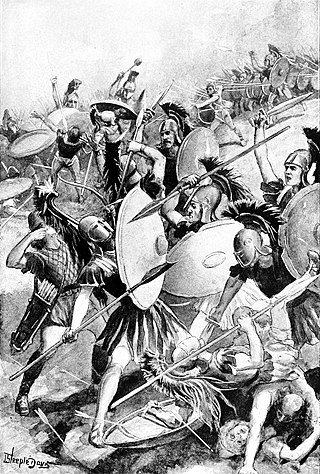
The Peloponnesian War was an ancient Greek war fought between Athens and Sparta and their respective allies for the hegemony of the Greek world. The war remained undecided for a long time, until the decisive intervention of the Persian Empire in support of Sparta. Led by Lysander, the Spartan fleet, built with Persian subsidies, finally defeated Athens and started a period of Spartan hegemony over Greece.

The 5th century BC started the first day of 500 BC and ended the last day of 401 BC.
This article concerns the period 429 BC – 420 BC.
This decade witnessed the continuing decline of the Achaemenid Empire, fierce warfare amongst the Greek city-states during the Peloponnesian War, the ongoing Warring States period in Zhou dynasty China, and the closing years of the Olmec civilization in modern-day Mexico.

This is a timeline of ancient Greece from its emergence around 800 BC to its subjection to the Roman Empire in 146 BC.

Alcibiades was an Athenian statesman and general. The last of the Alcmaeonidae, he played a major role in the second half of the Peloponnesian War as a strategic advisor, military commander, and politician, but subsequently fell from prominence.
Year 421 BC was a year of the pre-Julian Roman calendar. At the time, it was known in Rome as the Year of the Consulship of Vibulanus and Barbatus. The denomination 421 BC for this year has been used since the early medieval period, when the Anno Domini calendar era became the prevalent method in Europe for naming years.

Nicias was an Athenian politician and general during the period of the Peloponnesian War. Nicias was a member of the Athenian aristocracy and had inherited a large fortune from his father, which was invested in the silver mines around Attica's Mt. Laurium. Following the death of Pericles in 429 BC, he became the principal rival of Cleon and the democrats in the struggle for the political leadership of the Athenian state. He was a moderate in his political views and opposed the aggressive imperialism of the democrats. His principal aim was to conclude a peace with Sparta as soon as it could be obtained on terms favourable to Athens.

The Sicilian Expedition was an Athenian military expedition to Sicily, which took place from 415–413 BC during the Peloponnesian War between Athens on one side and Sparta, Syracuse and Corinth on the other. The expedition ended in a devastating defeat for the Athenian forces, severely impacting Athens.

The History of the Peloponnesian War is a historical account of the Peloponnesian War, which was fought between the Peloponnesian League and the Delian League. It was written by Thucydides, an Athenian historian who also served as an Athenian general during the war. His account of the conflict is widely considered to be a classic and regarded as one of the earliest scholarly works of history. The History is divided into eight books.
Agis II was the 18th Eurypontid king of Sparta, the eldest son of Archidamus II by his first wife, and half-brother of Agesilaus II. He ruled with his Agiad co-monarch Pausanias.

Demosthenes, son of Alcisthenes, was an Athenian general during the Peloponnesian War.

Hyperbolus was an Athenian politician active during the first half of the Peloponnesian war, coming to particular prominence after the death of Cleon. In 416 or 415 BC, he was the last Athenian to be ostracised.
Lamachus was an Athenian strategos or general in the Peloponnesian War. He commanded as early as 435 BCE, and was prominent by the mid 420s. Aristophanes caricatured him in The Acharnians and subsequently honoured his memory in The Frogs. He was one of the three generals placed in command of the Sicilian Expedition.
The Athenian coup of 411 BC was the result of a revolution that took place during the Peloponnesian War between Athens and Sparta. The coup overthrew the democratic government of ancient Athens and replaced it with a short-lived oligarchy known as the Four Hundred.

Classical Greece was a period of around 200 years in Ancient Greece, marked by much of the eastern Aegean and northern regions of Greek culture gaining increased autonomy from the Persian Empire; the peak flourishing of democratic Athens; the First and Second Peloponnesian Wars; the Spartan and then Theban hegemonies; and the expansion of Macedonia under Philip II. Much of the early defining mathematics, science, artistic thought, theatre, literature, philosophy, and politics of Western civilization derives from this period of Greek history, which had a powerful influence on the later Roman Empire. Part of the broader era of classical antiquity, the classical Greek era ended after Philip II's unification of most of the Greek world against the common enemy of the Persian Empire, which was conquered within 13 years during the wars of Alexander the Great, Philip's son.
The period of the 5th century BC in classical Greece is generally considered as beginning in 500 BC and ending in 404 BC, though this is debated. This century is essentially studied from the Athenian viewpoint, since Athens has left more narratives, plays and other written works than the other Greek states. If one looks at Athens, our principal source, one might consider that this century begins in 510 BC, with the fall of the Athenian tyrant and Cleisthenes's reforms. If one looks at the whole Greek world, however, we might place its beginning at the Ionian Revolt in 500 BC, that provoked the first Persian invasion of 492 BC. The Persians were finally defeated in 490 BC. A second Persian attempt failed in 480–479 BC. The Delian League then formed, under Athenian hegemony and as Athens' instrument. Athens' excesses caused several revolts among the allied cities, which were all put down by force, but Athenian dynamism finally awoke Sparta and brought about the Peloponnesian War in 431 BC. After both sides were exhausted, a brief peace occurred, and then the war resumed to Sparta's advantage. Athens was definitively defeated in 404 BC, and some internal Athenian agitations ended the 5th century in Greece.

The history of Sparta describes the history of the ancient Doric Greek city-state known as Sparta from its beginning in the legendary period to its incorporation into the Achaean League under the late Roman Republic, as Allied State, in 146 BC, a period of roughly 1000 years. Since the Dorians were not the first to settle the valley of the Eurotas River in the Peloponnesus of Greece, the preceding Mycenaean and Stone Age periods are described as well. Sparta went on to become a district of modern Greece. Brief mention is made of events in the post-classical periods.
The second Battle of Hysiae between the armies of Argos and Sparta took place in 417 BC during the Peloponnesian War, directly following Sparta's decisive defeat of the Argive/Athenian alliance in the Battle of Mantinea the year before.
The Battle of Orneae was an engagement that took place in the winter of 417 BC during the Peloponnesian War in the city of Orneae, between a Spartan garrison left in Orneae after the Battle of Hysiae and the forces of Argos and Athens.









